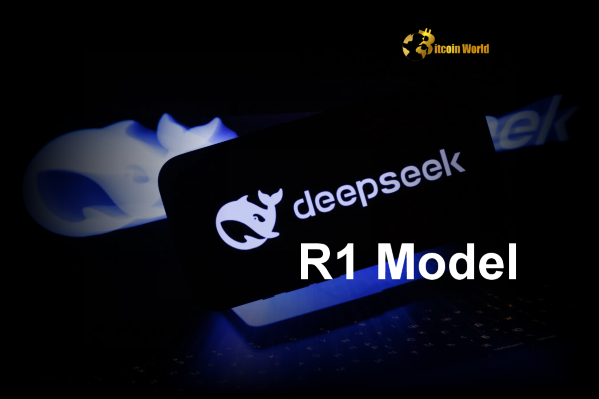In the rapidly evolving world of artificial intelligence, new models are constantly pushing boundaries, often delivering impressive performance gains. However, advancements aren’t always purely technical. Recent findings concerning the latest DeepSeek AI model from China highlight a growing concern: increased AI Censorship, particularly on subjects deemed sensitive by the Chinese government. This development is highly relevant as the global tech landscape, including areas like cryptocurrency and blockchain which value open information, increasingly interacts with AI systems developed worldwide.
What Did the DeepSeek AI Test Reveal?
DeepSeek, a prominent Chinese AI startup, recently updated its R1 reasoning model, introducing a version known as R1-0528. Initial tests showed this model achieving strong results on standard benchmarks covering coding, math, and general knowledge, putting it in a competitive position against leading models like OpenAI’s flagship offerings.
However, independent testing conducted by the pseudonymous developer behind SpeechMap, a platform comparing how different AI Models handle controversial subjects, painted a different picture regarding its willingness to answer certain questions. The developer, known as ‘xlr8harder’ on X, specifically tested the model’s responses to topics considered contentious by the Chinese government.
According to xlr8harder’s findings:
- R1-0528 appears ‘substantially’ less permissive of contentious free speech compared to previous DeepSeek releases.
- It was found to be the ‘most censored DeepSeek model yet for criticism of the Chinese government.’
- Specific sensitive topics, such as the internment camps in China’s Xinjiang region, often received censored responses or the official government stance, despite the model sometimes acknowledging human rights abuses in other contexts.
These results suggest a deliberate shift towards greater caution or restriction in the model’s outputs when interacting with politically sensitive queries.
Understanding AI Censorship in Chinese AI Models
The observed AI Censorship in DeepSeek’s R1-0528 is not an isolated incident but reflects the regulatory environment for Chinese AI. China has implemented stringent information controls for artificial intelligence models.
A law enacted in 2023 mandates that models must not generate content that ‘damages the unity of the country and social harmony.’ This broad definition can encompass any content that challenges the government’s official historical or political narratives.
To comply with these regulations, Chinese startups often employ various methods to censor their AI Models, including:
- Implementing prompt-level filters to block sensitive questions.
- Fine-tuning the models on datasets that avoid or present sensitive topics in a specific, approved manner.
Previous studies and observations support this trend. For instance, research indicated that DeepSeek’s original R1 model refused to answer a significant percentage of questions deemed politically controversial by the government. Other openly available Chinese Generative AI models, like video generators Magi-1 and Kling, have also faced criticism for censoring topics such as the Tiananmen Square massacre.
Why Does AI Censorship Matter for AI Models?
The presence of significant AI Censorship, particularly in capable AI Models like the updated DeepSeek R1, raises important questions about the nature and reliability of the information they provide. While these models may excel at technical tasks, their limitations on certain topics can lead to:
- Incomplete or Biased Information: Users may not receive a full or neutral perspective on sensitive subjects.
- Lack of Critical Analysis: The models may be unable or unwilling to engage in critical discussion or analysis of government policies or historical events.
- Reduced Trust: Awareness of censorship can erode user trust in the model’s outputs, especially when seeking objective information.
This issue extends beyond just factual recall; it impacts the potential for AI to be a tool for open inquiry and diverse perspectives. As Clément Delangue, CEO of Hugging Face, warned, there are potential unintended consequences when Western companies or developers build upon openly licensed Chinese AI models that operate under such restrictive controls.
The Broader Implications for Generative AI
The case of the updated DeepSeek AI model serves as a significant example of how regulatory environments shape the capabilities and limitations of Generative AI. As AI technology becomes increasingly integrated into various aspects of life, including potentially in areas related to finance, news dissemination, and social interaction, the presence of built-in censorship becomes a critical factor.
For developers and users globally, understanding the potential for censorship in AI Models, particularly those developed in regions with strict controls, is crucial. It highlights the need for transparency regarding training data, fine-tuning processes, and content moderation policies. It also underscores the importance of diverse sources and independent verification when relying on AI for information on sensitive topics.
In conclusion, while DeepSeek’s updated R1 model demonstrates technical prowess, the findings of increased AI Censorship regarding sensitive political topics are a notable concern. This situation reflects the unique challenges and regulatory pressures faced by Chinese AI developers and serves as a reminder for the global community to consider not just the performance benchmarks, but also the underlying constraints and potential biases built into the AI Models they interact with.
To learn more about the latest AI models trends, explore our article on key developments shaping Generative AI features.
Disclaimer: The information provided is not trading advice, Bitcoinworld.co.in holds no liability for any investments made based on the information provided on this page. We strongly recommend independent research and/or consultation with a qualified professional before making any investment decisions.


